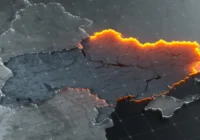Ukraine should use its unique position to become a bridge between Russia and the West.
“Ukraine should make use of its geopolitical advantages and become a bridge between Russia and the West,” quipped an ambitious Viktor Yanukovych, following his victory in the 2010 Ukrainian presidential election. Despite this emphasis on Ukraine’s strong European identity, the president changed course under pressure from Russia and rejected the European Union Association Agreement in November 2013. The Maidan protests followed, leading to Yanukovych’s ousting and Russia’s subsequent annexation of Crimea.
After a year of violent fighting between Kiev and pro-Russian separatists in the east, Ukraine’s economy is now on the verge of collapse, and the displaced population has reached over 1.7 million. But with fighting coming to a rickety standstill under the Minsk II agreement, do Yanukovych’s words still carry weight? Five years on, can Ukraine fulfill her position as a vital bridge between East and West?
A Sovereign Ukraine
While Kiev and Moscow have been committed to fulfilling the military obligations and heavy weapons pullback as stipulated under the Minsk II agreement, there is still much to be done before Ukraine reemerges as a sovereign nation. Currently, implementation of the political components of the Minsk deal appears to have hit a roadblock, and Kiev has yet to grant the separatist regions autonomy, open dialogue over their future elections or unfreeze the economic blockade put in place on the two “people’s republics.” Moreover, on April 6, Ukrainian President Petro Poroshenko denounced calls for “federalization” of the country, liking such calls to “bacteria trying to infect Ukraine and destroy our unity.”
The deadlock has largely come about as a result of the loopholes present in the Minsk II agreement. In a typical catch-22, the Kiev government argues that the rebels cannot govern themselves until elections are held, while the rebels insist the government must first grant the separatist regions autonomy before holding a legitimate vote.
However, Poroshenko has previously expressed his readiness “to grant Donbass special economic zone status with its own regime governing relations with the EU and Russia.” Such a scenario would be a feasible compromise that will stop short of federalization, and one that would ensure Ukraine’s sovereignty over its borders while awarding Donbass the power to become a strong economic force in the country. But would this be enough?
A Reformed Ukraine
The recent approval by the International Monetary Fund (IMF) to inject $10 billion into Ukraine’s economy over the next year as part of its larger $40 billion bailout has led many to hope for what Christine Lagarde has called “immediate economic stabilization.” These funds will be coupled with an extra $7.5 billion from international organizations, and $15.4 billion in debt relief that Ukraine aims to negotiate with bondholders.
Dmitry Firtash, a Ukrainian businessman, is behind an ample recovery plan to help Ukraine overcome the damage caused by its devastating civil war. During an investment forum called “Ukraine Tomorrow” in Vienna on March 3 — attended by bigwigs such as former UK European Commissioner Lord Mandelson, German Finance Minster Peer Steinbrück and Austrian Foreign Minister Sebastian Kurz among others — Firtash advocated for Ukraine’s closer integration with the West and announced the establishment of the Agency for Modernization of Ukraine (AMU). Meant to attract $300 billion in investment in order to reform and stabilize the country’s economy, the agency “will be structured in a number of directions focused on particular policy areas and led by experienced European politicians or business leaders.”
Firtash, who is currently residing in Austria, is facing US extradition charges at the request of the FBI, which alleges he was involved in bribing officials in India. However, his controversial reputation is unlikely to have any profound affect on the realization of the AMU initiative. Vienna’s Higher Regional Court has already concluded in his favor, claiming the US does not have sufficient evidence to prove Firtash’s involvement in corrupt practices in India.
While Firtash is a strong proponent for Ukraine’s collaboration with the West and is already in talks with potential investors for the implementation of the program, he has insisted that in order to address the difficult challenges ahead, the three key powers, “Europe, Ukraine, and Russia should sit down together and talk things through.”
Alienating Ukraine is Counterproductive
Indeed, Russia too has a vital role to play in its neighbor’s economy. Prior to the crisis, 6.8% of Ukraine’s foreign direct investment (FDI) came from Russia, although the real figure is likely to be much higher. Furthermore, Russian and Ukrainian banking and energy sectors are extremely intertwined, and despite the crisis, the two countries are maintaining their long-term industry and trade relationship.
Given that Ukraine’s economy needs Russia, and vice versa, Moscow cannot afford postponing a constructive dialogue with the European Union (EU) and Ukraine for much longer. Against the backdrop of falling oil prices and the weight of international sanctions, Russia’s economy is set to contract this year by 3% and by 1% in 2016. Russia could help its own economy by collaborating with Ukraine, not least in the form of a new gas deal and return of FDI, but also by cooling tensions with Kiev, which could result in the removal of sanctions and open Russia back up to international financing.
Easing the burden on Ukraine’s economy by offering a much needed gas discount will prove to be a sign of good faith and will effectively signal Russia’s acknowledgement that alienating Ukraine would be counterproductive. Following the European Commission’s letter to the Russian government, requesting it to consider giving Ukraine a discount on gas exports, Moscow sent a formal demand for Gazprom to lower its Ukraine prices, indicating that there may indeed be room for compromise in bilateral relations.
Toward a New Ukraine
There are many lessons to be learnt from the past as we look toward a new Ukraine. While Russian aggression in Ukraine should by no means go unpunished, it was the lack of consideration toward Russian interests in the discussions prefacing the European Union Association Agreement that led to Moscow’s hostility and to Yanukovych’s rejection of the EU proposal. It was only in summer 2013 that the text of the agreement was finally published in finer detail, which “clearly showed to [the Russians] that with such an agreement Ukraine would no longer be able to maintain the same level of relations” with Russia. Despite Russian hostility toward the agreement, the EU continued with the process without consultation, and it pushed forward with the deal.
Had the EU embarked on meaningful trilateral dialogue at the first signs of Russia’s discontent, there is a high chance the whole crisis could have been averted or minimized through a diplomatic solution agreed to by all sides.
We must remember that Ukraine does not belong to the East or the West. While the country has to develop a strong relationship with Europe, it has historical and economic ties to Russia as well. With this in mind, Kiev is excellently placed to become a mediator between the two power blocs in the medium-term. No other country can claim the same mixed heritage and the same tightly knit relationship with Russia while still maintaining ample European aspirations.
But to achieve this, Ukraine has to get its house in order first. The government in Kiev could start by upholding its end of the deal under the Minsk II agreement by granting the separatist republics autonomy and amnesty, while organizing elections in the region that will abide by Ukrainian law. These should be the first steps to ensure dialogue between all sides continues and that the truce does not fall through due to lack of trust among the signing parties.
As noted by a now disgraced Yanukovych, Ukraine is “a nation of great things, but we will accomplish none of them if we continue to bicker among ourselves … Developing a good relationship with the West and bridging the gap to Russia will help Ukraine.”
It’s time for Kiev to stop being a pawn and become a kingmaker on the European continent.
The views expressed in this article are the author’s own and do not necessarily reflect Fair Observer’s editorial policy.
Photo Credit: Africa Studio / IgorGolovniov / Shutterstock.com
 We bring you perspectives from around the world. Help us to inform and educate. Your donation is tax-deductible. Join over 400 people to become a donor or you could choose to be a sponsor.
We bring you perspectives from around the world. Help us to inform and educate. Your donation is tax-deductible. Join over 400 people to become a donor or you could choose to be a sponsor.
Support Fair Observer
We rely on your support for our independence, diversity and quality.
For more than 10 years, Fair Observer has been free, fair and independent. No billionaire owns us, no advertisers control us. We are a reader-supported nonprofit. Unlike many other publications, we keep our content free for readers regardless of where they live or whether they can afford to pay. We have no paywalls and no ads.
In the post-truth era of fake news, echo chambers and filter bubbles, we publish a plurality of perspectives from around the world. Anyone can publish with us, but everyone goes through a rigorous editorial process. So, you get fact-checked, well-reasoned content instead of noise.
We publish 2,500+ voices from 90+ countries. We also conduct education and training programs
on subjects ranging from digital media and journalism to writing and critical thinking. This
doesn’t come cheap. Servers, editors, trainers and web developers cost
money.
Please consider supporting us on a regular basis as a recurring donor or a
sustaining member.
Will you support FO’s journalism?
We rely on your support for our independence, diversity and quality.








Comment